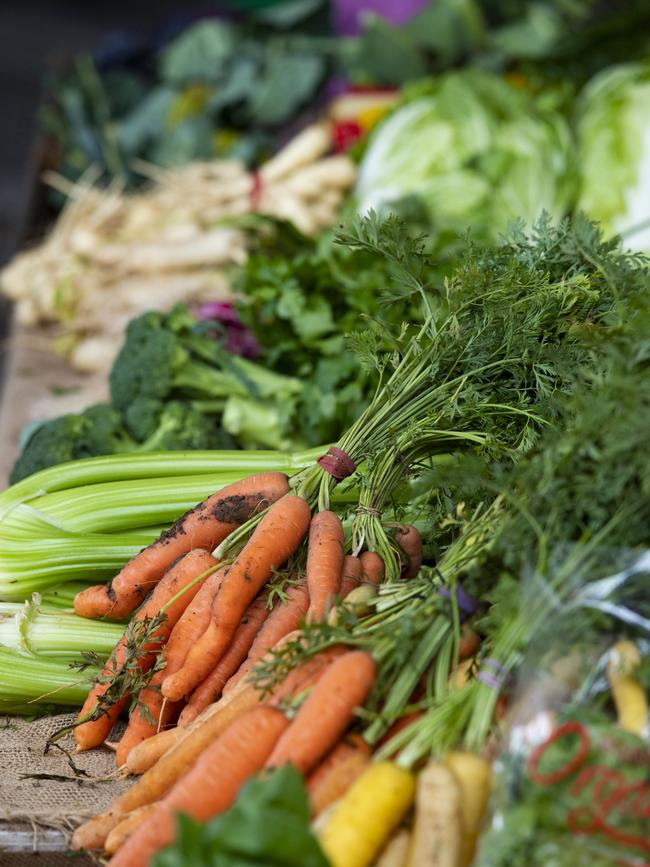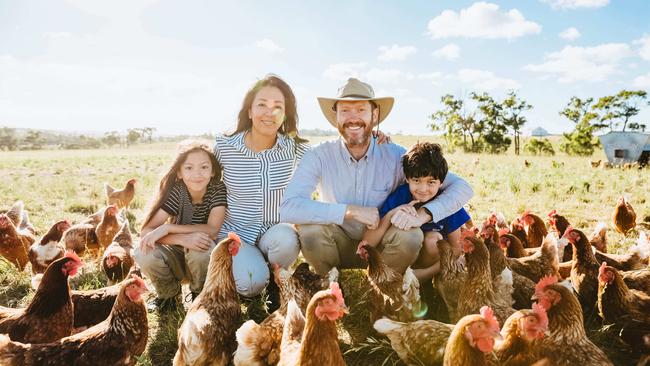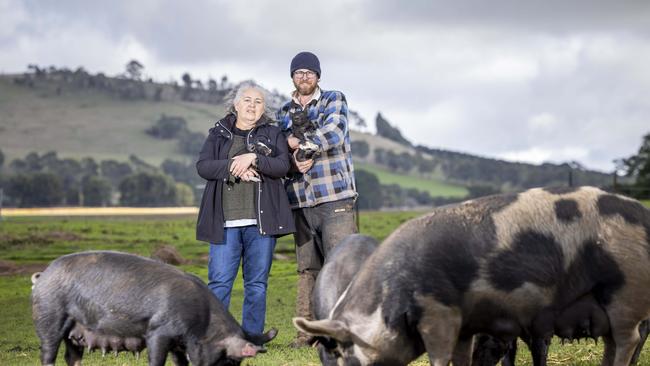Farmers’ markets: Hope for bumper Christmas weekend after year of sluggish sales
Markets across Victoria have a rich offering this weekend, giving shoppers a treat and traders a boost after a year of slowing sales.
Farmers’ markets will be bursting with everything from summer vegies and cherries to free-range hams and cream this weekend, giving shoppers a chance to stock up on farm-fresh produce for Christmas.
Festivities kick off today, with twilight markets at Myrtleford and Kingston, followed by a bumper schedule in Melbourne on Saturday and Sunday.
Myrtleford farmers’ market co-ordinator Louise Benini said they were “jam-packed” with 36 stallholders.
“I think that’s the biggest number we’ve had,” Ms Benini said.
“Myrtleford has an amazing local support base of customers. But because of where we’re located, we also get a good per cent of visitors coming through.”
She urged anyone stocking up for Christmas to try a local farmers’ market: “You’ll be amazed at how fresh the products are,” she said. “And you’re speaking to the farmer, the baker, the cheesemaker, the producer. You’re supporting local.
“A farmers’ market may not be able to fill all your gaps, but it will fill quite a bit.”
Expect summer berries, vegetables, smoked meats, cheese, trout, salmon, pate and even a festive cocktail at Myrtleford today.
And a special “man in red” might gate crash, Ms Benini said.
PRE-CHRISTMAS FARMERS’ MARKETS

FRIDAY, DECEMBER 22
Myrtleford, 4pm-8pm
Kingston, 3.30pm-6.30pm
SATURDAY, DECEMBER 23
Bentleigh, 8am-12.30pm
Carlton, 8am-1pm
Coburg, 8am-1pm
Elwood, 8.30am-1pm
SUNDAY, DECEMBER 24
Alphington, 9am-1pm
Eltham, 7am-10am
Flemington, 8.30am-12.30pm
OTHER DECEMBER MARKETS
WEDNESDAY, DECEMBER 27
Castlemaine, 2.30pm-5.30pm
THURSDAY, DECEMBER 28
Bendigo, 1pm-4pm
UNSETTLED MARKET
Sluggish farmers’ markets sales are a concern for producers and market managers, who are being squeezed by cost-of-living pressures and rising costs.
Veteran stallholders have reported a dip in sales this year compared to previous seasons, attributing the slowdown to fewer customers at some markets and reduced spend.
But benefits of trading at markets still outweigh the convenience of selling wholesale, farmers say, citing customer loyalty and the ability to set prices as two big drawcards.
Market gardener David Tatman, of Spring Creek Organics at Navigators, has 30 years experience in the industry, and has been selling mainly through farmers’ markets for the past 14 years.

He attends at least seven markets a month, and says footfall has slowly decreased after a bumper 2022.
“We reckon it is a lot lighter than it normally is,” Mr Tatman said. “Even though we have a tremendous amount of produce right now, it is not going to translate into more sales.”
He attributed the slowdown to hectic end-of-year schedules, but also said shoppers were buying less. He said customers didn’t report prices as a barrier, but he wouldn’t put up retail rates despite the cost of diesel, labour and fertiliser squeezing his margins.
“There are very few things we can try to push ahead (in price),” he said, “because people will start to stop buying.
“We are still comparable to supermarkets, either at the same price or cheaper, and we are certified organic.”
Free-range egg producer Kelvin Slade, of Willow Zen in Gippsland, sells at 15 markets a month and said sales were down compared to past years, but not by much.
“We have a really loyal set of customers who know we will turn up no matter what,” he said.
Mr Slade said his regulars were still buying, but the value of each shop was decreasing.

He was more concerned about rising costs such as council rates, insurance, feed and electricity.
“Those have all gone up by 30 per cent in 18 months,” he said. “It’s really killing us.
“Selling at farmers’ markets means we dictate more of a price, but I still haven’t taken my prices up by 30 per cent over that period.”
Melbourne Farmers Markets has slimmed down its locations in the past year, now running markets at just three sites: Alphington, Coburg and Carlton.
Chief executive Anne Duncan said the group decided to decrease locations and increase frequency to weekly, instead of monthly, to offer stallholders a more reliable income and customers the chance to make market shopping a more regular practice.
“It really was a decision to allow markets to support a regular shop,” she said. “Even though it looks like we are doing less markets, we are actually doing more markets on a more regular basis.”
She said customer numbers at MFM’s newer markets were actually increasing, but it had become “more difficult to maintain both volume and value” of sales.

“The biggest challenge is the economic climate,” Ms Duncan said. “I think customers are much more aware of the disposable income they have, and much more savvy when it comes to using that.”
Kingston and Berwick farmers’ market manager Geoff Rankin said he had counted a slight drop in attendance at both markets, but his biggest challenge was retaining diversity of stallholders.
“There are not many stone fruit stallholders in the industry at the moment, and not many poultry farmers,” he said. “Production costs are affecting some of them.”
Pork and beef producer Jono Hurst, of Brooklands Free Range Farms at Blampied, sells 80 per cent of his produce through farmers’ markets and said his loyal customer base was still buying every week, but some were trading down to less expensive cuts.
His biggest concern was access to abattoir services.




